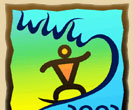

THE ELEVENTH INTERNATIONAL
|
Sheraton Waikiki Hotel Honolulu, Hawaii, USA 7-11 May 2002 |
http://www2002.org |
 |
|||
|
||||
The Web Engineering Track will use the same procedures as the
refereed papers track submission instructions
shown on the main Call for Particiption web page.
Please note that the key dates for this Alternate Track
differ from the Refereed Papers Track.
Accepted Alternate Track papers will be published
in a non-ACM produced proceeding.
The World Wide Web is having phenomenal impact on business, industry, finance, education, government, entertainment, and other sectors. The Web's initial scope as an environment for information exchange has been significantly extended, and a whole range of new applications is emerging in the Web environment. The Web also serves as a platform for many distributed applications. The original simple and well-defined document-oriented model of the Web, which limits the Web's potential, is being extended and enhanced by initiatives such as Semantic Web to cater to advanced applications.
Web application development is, however, still mostly ad hoc, generally lacks disciplined and systematic approaches, causing concerns about their maintainability, quality and reliability. It often neglects appropriate established practices from other disciplines such as Hypermedia and HCI to create, manage, and reuse structures of the information space and enhance the end user experience. And in most cases, Web development suffers from its biggest potential: new technologies and devices allowing for ubiquitous use of these applications.
Web Engineering addresses these issues and focuses on systematic, disciplined and quantifiable approaches to the cost-effective development and evolution of high-quality, ubiquitously useable Web-based systems and applications.
This track covers processes, methodologies, system design, lifecycle and management of large Web-based systems and education and research issues. Further, it would discuss case studies and best practices, and pave directions further work.
Topics of interest include, but are not limited to:
Papers discussing relationship and interaction among Web development and other disciplines are also invited.
Last Reviewed: 3/26/02
its-conf@hawaii.edu